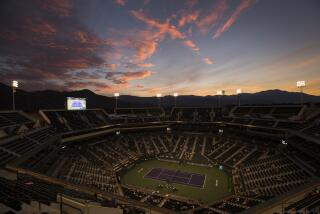McEnroe Default Served Up Volley of Confusion : Did Recent Tournament Need a Contingency Plan, or Insurance for Refunds?
- Share via
SAN FRANCISCO — You may have seen the commercial. In it, tennis promoters Jack Kramer and Barry MacKay show how a simple telephone call bailed MacKay out of a tight situation.
MacKay wanted Jimmy Connors to play in a Bay Area tournament, but was worried that an injury might prompt him to drop out. A call to old friend Kramer in Los Angeles does the trick. Kramer talks to Connors, MacKay’s main drawing card for his Trans-Am Tournament in San Francisco, and a near disaster for a tennis promoter is averted over the phone.
In the real world, however, Kramer needed much more than a simple telephone call to avert the problems that plagued his recent Volvo tournament in Los Angeles. Not only did the attrition rate among his top seeded players--Connors and Pat Cash among them--increase as the tournament approached, but a promoter’s nightmare became reality in the semifinals.
Kramer’s remaining drawing card, John McEnroe, was forced to withdraw from the tournament because of a stomach virus. That left Kramer with a Saturday night program of no singles match and only a doubles match to satisfy fans who had paid as much as $30 a ticket to see McEnroe.
Kramer’s course of action that night was not pre-set. The normally well-planned tournament structure of professional tennis approached chaos because of McEnroe’s illness.
What became clear in the wake of McEnroe’s default and the public’s demand for ticket refunds was that tennis has not yet determined an equitable way of handling this kind of situation. At least the L.A. Volvo tournament has not.
McEnroe contacted tournament referee Don Wiley at 5:30 p.m. to request that a doctor be sent to his home in Malibu. At 7, tournament chairman Kramer was told that McEnroe, on the advice of the tournament physician, would not play. That was an hour before the match was scheduled to begin.
Kramer already had a near capacity crowd gathered at center court. More fans were streaming in. He was concerned that the doubles match, which had been scheduled to follow the singles, would not be enough show to satisfy the crowd.
“We tried to get something going,” Kramer said this week. “I went to Paul Annacone (who had been scheduled to play McEnroe, and then play in a semifinal doubles match). I hoped the kid would agree to play a best-of-five-set match, as an exhibition. We would have come up with some money.
“He said he’d have to talk it over with his brother (who is his coach) and his doubles partner. Paul decided it was not smart for him to do it. He said, ‘What would happen if I sprained my ankle in the fourth or fifth set?’
“If we had known earlier, we could have talked to Jimmy Arias or Brad Gilbert. We wouldn’t have liked it, but it would have been something.”
Perhaps, but as it happened, Kramer had nothing. He moved up the doubles to 8:15 p.m. There was an announcement that there would be no refunds. Many in the crowd were angry and the credibility of Kramer as a promoter, and the L.A. Volvo as a tournament, was damaged.
“We are in the same boat as a boxing match,” Kramer said. “Tennis is only as good as the people who are still in the tournament. The tournaments of the world would want to make sure that players don’t frivolously mess them up with the public.
“It’s a hell of a business to be in. There are risks. All I hope is that in the future we get an earlier diagnosis.”
Surprisingly, tennis promoters and tournament directors have no contingency plans or set procedures to deal with such a predicament. In the Los Angeles tournament, officials waffled on the ticket refund decision and they waffled on the exhibition match.
“From a credibility standpoint, I really sympathize with the position Jack was in,” MacKay said. “It’s a tough question. There are all kinds of situations that come up. I don’t think you can legislate. If I had some miracle solution, I’d pass it along to my tournament director friends.”
MacKay said that he promoted a small tournament in San Jose a few years ago that featured Bjorn Borg. The day before the first match, Borg pulled a stomach muscle. MacKay, having the luxury of time Kramer did not, called a press conference on the afternoon of the evening match. Did he refund tickets-buyers’ money?
“I was prepared to do that if anyone was unhappy,” he said. “We’ve always had a policy if that happens, we’d refund it gladly. We’ve gladly dealt with people in a one-on-one basis. But we are not going out and saying, ‘Everybody line up.’ ”
It’s not a situation that is unique. Yet, there has been only one default in a Grand Slam final. That occurred in 1931 when Sidney B. Wood Jr. won by default over Francis X. Shields. Today’s players are traveling more and playing a higher level of tennis nearly 12 months a year. Injury and illness are not remote possibilities in tennis.
Why don’t tournament directors purchase insurance to protect themselves against situations such as this? Because they haven’t thought about it.
“I don’t know if there is such a thing as catastrophe insurance,” MacKay said. “From a dollars and cents standpoint, it would be smart for promoters to check it out. I haven’t. I really haven’t. But I’m going to now.”
Had Kramer thought about buying insurance? “I hadn’t considered it,” he said.
Players, of course, have a responsibility to notify tournament officials if they are ill. Players of McEnroe’s caliber surely know that they carry the gate at tournaments. The more money promoters make, the greater the chance that tournament purses, already huge, will increase.
In addition, even though appearance fees are not allowed under the rules, some top players are still paid to show up, regardless of how they do. It is bad faith, at the very least, for players to duck out, to take the money and run. Kramer said that McEnroe was not paid any appearance money.
“We took all the precautions we could,” Kramer said. “It’s very clear on the ticket, no refunds. If we had known at 2 p.m., I think my decision would have been to put a big sign at the ticket booths saying McEnroe would not play so we wouldn’t have people say they were sucked in. We definitely want credibility with our tennis public.”
More to Read
Go beyond the scoreboard
Get the latest on L.A.'s teams in the daily Sports Report newsletter.
You may occasionally receive promotional content from the Los Angeles Times.











